Air ambulances in the United Kingdom
Air ambulance services in the United Kingdom provide emergency medical functions, patient transport between specialist centres, or medical repatriation. Services are provided by a mixture of organisations, operating either helicopters or fixed-wing aircraft. All emergency air ambulance helicopters in England, Wales, and Northern Ireland are operated by charities, while Scotland has one charity service in addition to its two NHS-funded helicopters. Fixed-wing air ambulances, used for patient transport, may be government or privately operated.
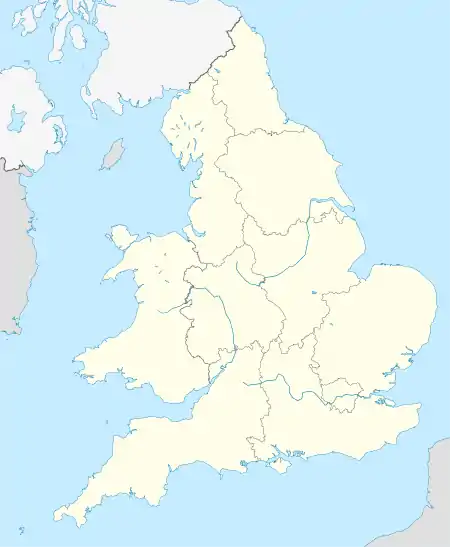
History
The first air ambulance services in the UK commenced in Scotland in November 1933, with a flight from Wideford Airport, Kirkwall Orkney. The first night time ambulance flight was undertaken in February 1939, from Wideford to the island of Sanday, using car headlights to help take off and landing. The aircraft used was a General Aircraft Monospar, registration G-ACEW, operated by Highland Airways.
Emergency air ambulances
Emergency air ambulances are generally helicopter based, and used to respond to medical emergencies in support of local ambulance services. In England, Wales, and Northern Ireland, all of these services are charitably funded, and either directly owned by the charity, or operated under contract with a private provider.[1] The ambulance staff and doctors crewing these flights are generally seconded from the local NHS ambulance service and NHS hospitals. In Scotland, there is the only publicly-funded air ambulance service, with the Scottish Ambulance Service operating two Airbus Helicopters H145 helicopters and two fixed wing aircraft in this role, alongside two charity-funded Eurocopter EC135 helicopters, operated by Scotland's Charity Air Ambulance.
| Organisation | Radio call-sign | Aircraft | Registration | Photograph | |
|---|---|---|---|---|---|
| Cornwall Air Ambulance | Helimed 01 | AW169[2] | G-CRWL[3] | _cropped.jpg.webp) | |
| The Air Ambulance Service | Derbyshire, Leicestershire & Rutland Air Ambulance | Helimed 54 | AW109SP | G-TAAS | .jpg.webp) |
| Warwickshire & Northamptonshire Air Ambulance | Helimed 53 | AW109SP | G-WNAS | .jpg.webp) | |
| Children's Air Ambulance
(emergency patient transfers only) |
Helimed 80 | 2 x AW169 | G-PICU | .jpg.webp) | |
| Helimed 81 | G-TCAA | 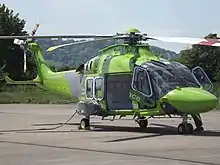 | |||
| Devon Air Ambulance | Helimed 70 | 2 × EC135 | G-DAAN |
.jpg.webp) | |
| Helimed 71 | G-DVAA | .jpg.webp) | |||
| Preparing for operation | H145 | G-DAAS | .jpg.webp) | ||
| Dorset and Somerset Air Ambulance | Helimed 10 | AW169 | G-DSAA | .jpg.webp) | |
| East Anglian Air Ambulance | Helimed 85 | 2 x H145 | G-RESU | .jpg.webp) | |
| Helimed 88 | G-HEMC | .jpg.webp) | |||
| Essex & Herts Air Ambulance | Helimed 07 | MD 902 | G-EHEM | .jpg.webp) | |
| Helimed 55 | AW169 | G-HHEM |  | ||
| Great North Air Ambulance | Helimed 58 | 3 × AS365 N2 | G-NHAA | _cropped.jpg.webp) | |
| Helimed 63 | G-NHAB | _Pride_of_Cumbria_aircraft_(G-NHAB).jpg.webp) | |||
| Dedicated spare | G-NHAC | .jpg.webp) | |||
| Preparing for operation | AS365 N3 | G-NHAD | |||
| Great Western Air Ambulance | Helimed 65 | EC135 | G-GWAC | 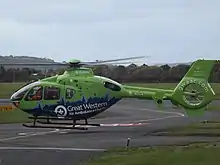 | |
| Hampshire and Isle of Wight Air Ambulance | Helimed 56 | H135 | G-HIOW | .jpg.webp) | |
| Air Ambulance Kent Surrey Sussex | Helimed 60 | 2 x AW169 | G-KSST | .jpg.webp) | |
| Helimed 21 | G-KSSC | 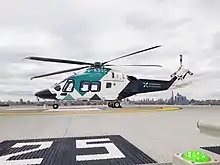 | |||
| Dedicated spare | MD 902 | G-KSSA | 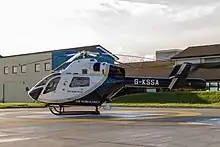 | ||
| Lincolnshire & Nottinghamshire Air Ambulance | Helimed 29 | AW169 | G-LNCC | .jpg.webp) | |
| London's Air Ambulance | Helimed 27 Helimed 28 spare unit for major incidents |
2 x MD 902
(One spare) |
G-EHMS | .jpg.webp) | |
| G-LNDN | .jpg.webp) | ||||
| Magpas Air Ambulance | Helimed 66 | AW169 | G-MGPS | 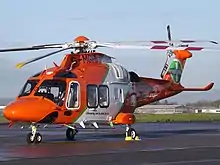 | |
| Midlands Air Ambulance | Helimed 03 | H145 | G-RMAA | .jpg.webp) | |
| Helimed 06 | 2 x EC135 | G-OMAA | .jpg.webp) | ||
| Helimed 09 | G-HWAA | .jpg.webp) | |||
| North West Air Ambulance | Helimed 08 | 3 x EC135 | G-NWAA | _(46273658405).jpg.webp) | |
| Helimed 72 | G-NWAE | .jpg.webp) | |||
| Helimed 75 | G-NWEM | .jpg.webp) | |||
| Northern Ireland Air Ambulance | Helimed 23 | 2 x AW109SP | G-HEMZ
|
.jpg.webp) | |
| G-RSCU | .jpg.webp) | ||||
| Scotland's Charity Air Ambulance | Helimed 76 | 2 x EC135 | G-SCAA | 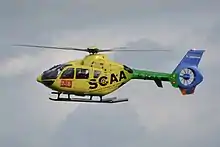 | |
| Helimed 79 | G-EMAA | ||||
| Scottish Air Ambulance | Helimed 02 | 2 x H145 | G-ISAS | ||
| Helimed 05 | G-GSAS | 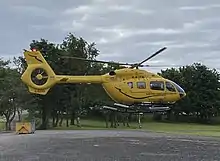 | |||
| Gama xxx | 2 x King Air 200C | G-SASC | .jpg.webp) | ||
| G-SASD | .jpg.webp) | ||||
| Thames Valley Air Ambulance | Helimed 24 | EC135 | G-TVAL | .jpg.webp) | |
| Wales Air Ambulance and Children's Wales Air Ambulance |
Helimed 57 | 3 x H145 | G-WENU | _Babcock_Mission_Critical_Services_Onshore_Ltd_(35487393015).jpg.webp) | |
| Helimed 59 | G-WOBR | .jpg.webp) | |||
| Helimed 61 | G-WROL | .jpg.webp) | |||
| Helimed 67 (Children's) | 1 x EC135 | G-WASC | _Bond_Helicopters_Wales_Air_Ambulance_(Bond_Helicopters)._(10444871213).jpg.webp) | ||
| Wiltshire Air Ambulance | Helimed 22 | Bell 429 | G-WLTS | 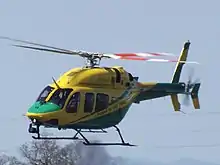 | |
| Yorkshire Air Ambulance | Helimed 98 | 2 x H145 | G-YOAA | .jpg.webp) | |
| Helimed 99 | G-YAAC | .jpg.webp) | |||
Patient transport operations
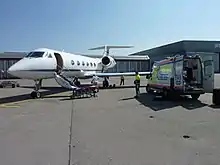
There are also a number of public and private patient transport operations in the UK, generally using fixed wing aircraft, and which are part of a system of moving patients between points of care, or as part of a repatriation to the UK. There is a helicopter based patient transfer service, focused on paediatric cases, called the Children's Air Ambulance, which first flew in 2012.[4]
The Scottish Ambulance Service operates two fixed wing aircraft in this role, with patients flown to the mainland UK for treatment.[5] In 2015, the neonatal, paediatric and adult emergency care and retrieval operations were brought together with the Scottish Ambulance Service and utilise the aircraft and road ambulances for this purpose. They are co-located at the Scottish Ambulance Air Base at Glasgow International Airport.
The Isle of Man Department of Health and Social Care operates a fixed-wing air ambulance for patient transport between the island and mainland hospitals.[6]
The Channel Islands of Guernsey and Jersey have a Beechcraft King Air B200 air ambulance, operated by Gama Aviation since July 2020, that transports patients to England for treatment that they cannot receive on the islands.[7] In addition, Aurigny operate a medical evacuation service from Alderney to Guernsey.[7]
Notable accidents involving air ambulances
- On 19 May 1996, a Britten-Norman BN-2 Islander aircraft operated by Loganair for the Scottish Ambulance Service crashed short of the runway at Lerwick/Tingwall Airport in Shetland while turning to final approach at night during strong and gusting winds. The pilot was killed, and the physician and flight nurse were injured. There was no patient on board at the time.[8]
- On 26 July 1998, the three man crew of the Kent Air Ambulance died when the aircraft collided with power lines and crashed in a field in Burham, near Rochester Airport.[9][10] Initial investigation established no definitive cause for the crash, due to the fireball produced on impact. Controversy ensued when the pilot's employers, Police Aviation Services, denied liability. On 19 February 2004, following a civil case brought by the pilot's widow to the High Court in Manchester, it ruled that the crash was caused by mechanical failure, not as suggested flying low for fun, and ordered compensation to be paid.[11]
- On 14 June 2000, four passengers and one pilot were killed when a Piper PA-31-350 Navajo Chieftain, chartered for a medical transfer from the Isle of Man, crashed on approach to Liverpool Airport.[12]
- On 15 March 2005, a Britten-Norman BN-2 Islander aircraft operated by Loganair crashed into the sea while descending toward Campbeltown Airport in western Scotland. The aircraft was operating an air ambulance flight on behalf of the Scottish Ambulance Service. The pilot and paramedic both died in the crash.[13]
See also
- Police aviation in the United Kingdom
- Emergency medical services in the United Kingdom
- Motorcycle ambulance
References
- "Amazing Facts about your Air Ambulance". Association of Air Ambulances. Retrieved 26 July 2009.
- Caygill, Greg. "Cornwall Air Ambulance expects new AW169 will save time & lives". Vertical Magazine. Retrieved 7 May 2020.
- "Cornwall Air Ambulance gives first glimpse of highly anticipated helicopter". Cornwall Air Ambulance. 5 September 2019. Retrieved 6 May 2020.
- "The Children's Air Ambulance". Express and Echo. 18 December 2012. Archived from the original on 19 June 2015. Retrieved 1 September 2014.
- "New air ambulance for NI after flight ordeal". BBC News.
- "Air Ambulance". Isle of Man Government. Retrieved 19 December 2020.
- "Channel Islands air ambulance changes provider". BBC News. 20 July 2020. Retrieved 6 January 2021.
- Air Accidents Investigation Branch. "BN2A-26 Islander, G-BEDZ, 19 May 1996". GOV.UK. Department for Transport, Air Accidents Investigation Branch. Retrieved 31 December 2015.
- Helicopter crash kills three BBC News, 27 July 1998
- "AAIB Bulletin No: 2/2000" (PDF). Air Accidents Investigation Branch. Archived from the original (PDF) on 16 March 2009. Retrieved 5 July 2009.
- "Air ambulance crash pilot cleared". BBC News. 19 February 2004.
- "Piper PA-31-350, G-BMBC" (PDF). AAIB. Retrieved 27 July 2013.
- "Air crew search called off". BBC News. 15 March 2005.